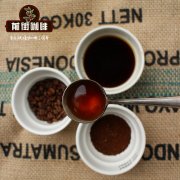Why do most coffee use Arabica? the reason for the strength of Arabica coffee beans.

Professional coffee knowledge exchange more coffee bean information please follow the coffee workshop (Wechat official account cafe_style)
Qianjie-Arabica variety introduction
In fact, boutique coffee shops have long disdained to promote "Arabica", but are more accurate to bean species, origin, production season, altitude, treatment, and so on.
Bean seed: iron pickup, bourbon, SL28, SL34, Rosa, etc. These common bean seeds (bean seed will have unique characteristics of bean seed)
Place of origin: a manor, a cooperative, a country (the flavor and characteristics of each place will be different)
Treatment: washing, solarization, honey treatment, double solarization, enzyme fermentation, special fermentation.
There are also differences in beans treated in different ways. Water washing will be cleaner and the acidity will be brighter than the sun, and the sun will be thicker and sweeter than water washing alcohol. Some special fermentation will have a special taste, such as some whisky barrel fermented beans have obvious whisky taste, etc.)
Arabica coffee beans are the berry seeds of Arabica plants and are one of the two largest coffee beans in the world for coffee production. The other is Robusta. Arabica coffee beans are regarded as high-quality coffee beans by many coffee lovers because of their low caffeine content, low acidity and more aromatic taste. High-quality Arabica coffee requires complicated manual picking, selection and meticulous processing, so the world's most expensive and best coffee beans are Arabica coffee.
Arabica coffee has a varied and broad potential flavor. Arabica coffee produced in different regions, different elevations and different climates usually has its own characteristics and can show a completely different flavor. "Arabica" coffee smells like grass when it is not roasted, and after proper roasting, it shows "fruity" (light roasting) and "caramel sweetness" (deep roasting).
Growing in the subtropics, Arabica coffee trees are usually planted at an altitude of 550m to 1010 m, where there are clear rainy and dry seasons. In this way, there can be a growing season and a harvest season every year.
Arabica coffee has rich and delicate taste, strong smell, high acidity, slippery texture and is not easy to have bitter taste. Its excellent flavor and aroma make it the only coffee that can be drunk directly.
Knowledge: Robusta is planted below 800 meters above sea level. Robusta has strong adaptability and strong resistance to diseases and insect pests.
In short: Qianjie is a coffee research hall, happy to share the knowledge about coffee with you, we share unreservedly just to make more friends fall in love with coffee, and there will be three low-discount coffee activities every month. The reason is that Qianjie wants to make more friends drink the best coffee at the lowest price, which has been Qianjie's tenet for 6 years!
END
Important Notice :
前街咖啡 FrontStreet Coffee has moved to new addredd:
FrontStreet Coffee Address: 315,Donghua East Road,GuangZhou
Tel:020 38364473
- Prev

The type of coffee beans is one of the most famous high-quality Arabica coffee beans indispensable conditions
Professional coffee knowledge exchange More coffee bean information Please pay attention to coffee workshop (Weixin Official Accounts cafe_style) Front Street-Arabica Variety Introduction Arabica coffee planting conditions are more stringent, requiring higher altitude (600 to 2000 meters above sea level), fertile soil, sufficient moisture, appropriate sunshine conditions and shade, Arabica
- Next

Is Robusta good to grow coffee? why is the reputation of Robusta coffee beans so bad?
Professional coffee knowledge exchange more coffee bean information please follow the coffee workshop (Wechat official account cafe_style) front street-Robusta variety introduction Robusta coffee is a kind of tree between shrubs and tall trees, the leaves are longer, the color is bright green, the tree can be up to 10 meters high, but the roots are very shallow, and the fruit is slightly rounder and smaller than Arabica coffee.
Related
- Beginners will see the "Coffee pull flower" guide!
- What is the difference between ice blog purified milk and ordinary milk coffee?
- Why is the Philippines the largest producer of crops in Liberia?
- For coffee extraction, should the fine powder be retained?
- How does extracted espresso fill pressed powder? How much strength does it take to press the powder?
- How to make jasmine cold extract coffee? Is the jasmine + latte good?
- Will this little toy really make the coffee taste better? How does Lily Drip affect coffee extraction?
- Will the action of slapping the filter cup also affect coffee extraction?
- What's the difference between powder-to-water ratio and powder-to-liquid ratio?
- What is the Ethiopian local species? What does it have to do with Heirloom native species?

